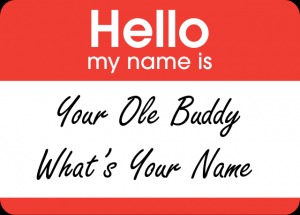 The sweetest sound, supposedly to a person’s ears, is their name. You can be in a packed room with loud conversation all around, hear your name called and immediately distill and hone in on that sound, aside from all the clamor.
The sweetest sound, supposedly to a person’s ears, is their name. You can be in a packed room with loud conversation all around, hear your name called and immediately distill and hone in on that sound, aside from all the clamor.
What mother doesn’t recall hearing the cry of “Mommy” on a playground, and all adult female heads turn to the youthful sound. It’s a built-in reflex.
Our own name – sweet music. But remembering other people’s names, now that can be a challenge, especially newcomers, or infrequent comers. Why is this? Names are especially hard to remember because most names have no tangible object connection to visually associate with.
Girls named after flowers (Rose, Daisy) or boys named after animals (Wolf, Bear) are easier, but still not a given that you will remember it (which flower name was it?)
Names are nothing more than a string of letters in some combination, with no basis to attach a connotation or an association to; this random group of consonants and vowel(s) have no reason for existence other than being a person’s name – what is a ‘Mary’ or a ‘John’?
Which makes unique name creation popular and easy for trendsetting parents choosing not to follow the common name route, but not so easy for the rest of us. Help me please – how do you pronounce Chaesa?
Name recall requires straight rote memorization. Foreign names can be especially problematic as the letter combinations are not always in known familiar language patterns.
With rote, you say the person’s name over and over again, aloud in conversation (which I find rather annoying) or in your head (making it harder to focus on what they’re actually saying) in the hopes that you will retain their name, encoding it into your long term memory through continuous repetition.
This method isn’t helpful when you don’t see the person frequently enough, and then are at a loss for the name when you bump into them next. “Sorry, I know I should know your name, but I can’t recall it. Please remind me of your name.” Really embarrassing when it really IS someone you should remember and you’re in essence saying, “You’re just not that memorable.” Ego slam, ouch!
Another name remembering technique is to think of another person you know with the same name as this new person, then associate some trait that the two have in common. Great if you know someone with the same name (and they usually have nothing in common to latch on to…) but with all the different and unusual names around today, this option is hardly reliable.
Since our brains are heavily visual and rely on our sight for data input, the best way to remember a new person’s name is to look at the person’s face (which, unlike attire, doesn’t change), looking for the outstanding feature (most memorable) and associating their name, a part of their name, a rhyme to their name to that facial feature, or with a trait associated with that feature. Probably easier said than done, but what can I say? – that’s the recommended method to remember names.
What I do know is that getting a person’s name right is important. Their identity, their respect, their pride is tied in with their name, so spelling and pronouncing it right is critical to building rapport and communicating caring.
Except from the cashier who deliberately uses my name when handing back my credit card as a (fake) show of closeness? caring? respect? Whatever the intent, I see it as disingenuous and dismiss the usage as a canned sales approach that has the opposite effect. Treat a person’s name with kid gloves, but only when you have permission to do so.
And please forgive me if I’ve forgotten your name when I see you next. I know that your name is important and I really do want to communicate caring and your importance to me, which will be obvious from my effort to not let on that I really don’t remember. But I hope you know that it’s really not my fault, as that string of letters your parents gave you is just not that easy to hold in memory.
